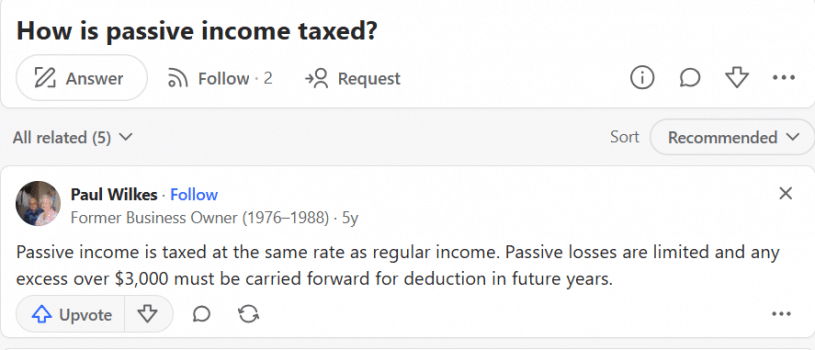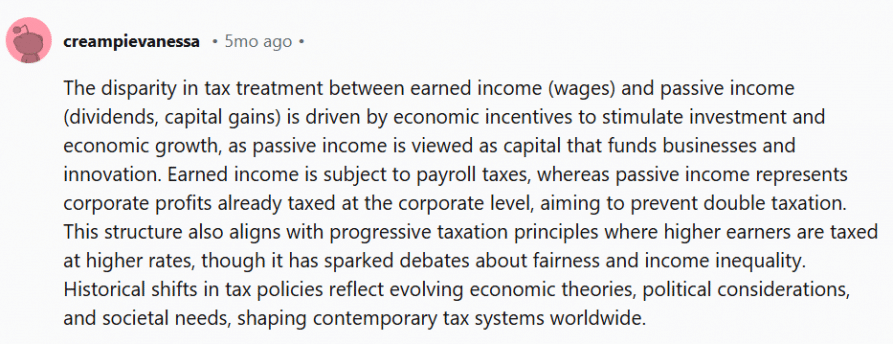Understanding How Passive Income Is Taxed

Passive income can seem like the ultimate financial freedom-earning money while you sleep! But how is passive income taxed? Understanding the rules set by the IRS is crucial to manage your finances effectively. Let’s explore what qualifies as passive income, its taxation, and practical tips to ensure you’re on the right track.
Need tax help? CuraDebt is here for you.
What Is Passive Income?
Passive income refers to earnings derived from sources where minimal effort is required to maintain the income flow. Unlike active income—where you trade your time and skills for money—passive income typically comes from investments or business ventures in which you are not actively involved daily.
Types Of Passive Income
Here are the most common types of passive income:
- Rental Income: Earnings from renting out property, whether residential or commercial.
- Dividends: Regular payments made by a corporation to its shareholders.
- Royalties: Income from intellectual property like books, music, or patents.
- Interest Income: Payments received from investments such as savings accounts or bonds.
- Limited Partnerships: Earnings from business investments where you’re not actively managing operations.
What Is Not Passive Income?
Not all income sources qualify as passive income. Here are examples of income that don’t fall under this category:
- Wages and Salaries: These are considered active income.
- Portfolio Income: While closely related, profits from the sale of investments (like stocks) are classified separately.
- Side Hustles: If you actively work on it, it doesn’t count as passive income.
How Is Passive Income Taxed?
Passive income is taxable, and the IRS treats it differently from active income. Here’s what you need to know:
1. Rental Income
- Taxable Amount: Gross rental income minus allowable expenses (e.g., maintenance, property taxes).
- Special Considerations: Depreciation of assets can reduce taxable income.
2. Dividends
- Qualified Dividends: Taxed at long-term capital gains rates (0%, 15%, or 20%).
- Ordinary Dividends: Taxed at regular income tax rates.
3. Royalties And Licensing
- Royalties are generally taxed as regular income. Ensure you track expenses for deductions.
4. Passive Activity Loss Rules
The IRS may limit deductions for losses incurred in passive activities. Losses can usually only offset income from other passive activities.
5. Self-Employment Tax Exclusion
Unlike active income, passive income is not subject to self-employment tax.
Tips For Managing Passive Income Taxes
Managing passive income taxes requires organization and proactive planning. One essential step is keeping detailed records of all income and related expenses. This practice not only ensures compliance with IRS rules but also helps you claim deductions, such as depreciation or property maintenance costs, to reduce taxable income.
Consulting a tax professional can also be invaluable. A CPA or tax advisor can guide you through the complexities of IRS regulations, uncover potential tax-saving strategies, and help you avoid costly mistakes. Additionally, investing through tax-advantaged accounts like IRAs or 401(k)s can defer or even reduce taxes on dividend-producing assets, making your income more efficient.
Finally, don’t overlook the impact of state taxes, as passive income rules vary widely. Familiarizing yourself with local regulations ensures you’re fully prepared for all tax obligations. To avoid unexpected liabilities, it’s wise to set aside a portion of your passive income specifically for taxes, ensuring you’re always ready when payments are due.
Do you need tax help? CuraDebt can help you! Start with a free consultation.
What People Are Saying Across Platforms
Seeking advice from forums like Reddit and Quora can provide valuable insights.
For example, on Quora, many users confirm that passive income is taxable.


On Reddit, a fascinating discussion reveals that passive income often has lower tax rates to encourage innovation and investment. This system aims to stimulate economic growth while rewarding those who take risks.


CuraDebt Reviews
If managing taxes on passive income feels overwhelming, or you’re facing financial difficulties, CuraDebt can help. As one of the leading debt relief companies, CuraDebt has helped thousands of clients regain control of their finances. With our free consultation, you can explore debt relief options tailored to your needs.



Conclusion: Understanding How Passive Income Is Taxed
In this article, we’ve looked at how passive income is taxed. We explained what counts as passive income, the different types, and the IRS rules you need to know. By understanding these taxes and following simple tips, you can handle your finances better and follow tax laws easily.
Whether you’re earning from rentals, dividends, or royalties, staying informed and organized is key to maximizing your earnings and minimizing tax liabilities. For those who need tax help, companies like CuraDebt can provide guidance and support through their debt relief services, including a free consultation to explore your options.
